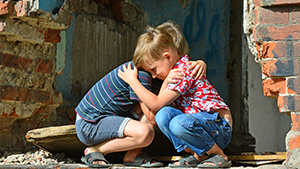The second webinar of “Solidarity: An ethical imperative for advancing the role of education in migrant and refugee inclusion in Europe” was carried out on 21 April 2021 with more than 50 participants from different fields of work related to education.
Under the title, “Psycho-social support for resilience and well-being of children in the context of migrant and refugee inclusion in Europe,” the webinar aimed at building a dialogue, especially with regards to unaccompanied minors. The session was moderated by Ms. Athanasia Rapti, Social Worker, Scientific Supervisor of Shelter for UAM, SYNYPARXIS.
During the webinar, participants reflected on the multifaceted role of psycho-social support for children as an essential procedure of their transition to adulthood and their smooth inclusion in host societies in Europe. Timely support can empower children, help them build resilience, and ensure their social, emotional and spiritual well-being of children. Psycho-social support can also help create conducive learning environments for children.
“Psychosocial support means support given to victims of disaster, catastrophe, violence and fostering resilience, which aims to ease resumption of normal life by preventing longer-term consequences of potentially traumatic situations,” explained Ms. Athanasia Kotsiatou, Director of Social and Legal Services, SYNYPARXIS.
Ms. Neelam Fida, Global Child Protection Advisor, Islamic Relief spoke about the critical gap in the response to provide spiritual care amongst survivor’s war and violence, considering the intense harm and trauma these children might have experienced, and the essential role that faith leaders can play as Psychosocial First Aiders when they are prepared with the technical know-how.
Ms. Efi Kallou, Educator, Shelters of Unaccompanied Minors, SYNYPARXIS, made a distinction between integration and inclusion. In integration, children are absorbed into the mainstream education system, which helps them become a part of a group but does not help them retain their cultural identity as they are the ones that have to adjust to the existing system. Inclusion educates children in a way that benefits all children, with their participation in the school environment without having to lose their cultural identity.
Panelists shared good practices and tools to support refugee children as well as working with host communities to promote inclusiveness. Mr. Karel Jungheim, Migration Specialist, Kerk in Actie talked about his experience in the Netherlands. He also highlighted how the Covid-19 pandemic has impacted especially the refugee children, who have had difficulties in accessing online education during lockdowns. Because of the unfavorable socioeconomic position of parents, refugee children are also more vulnerable to domestic violence.
After the panel discussion, participants formed breakout rooms to discuss reflections and recommendations on challenges, good practices and tools that can be used in the framework of psychosocial support.
The Solidarity project is a collaboration between Arigatou International and the Integration Center for Migrant Workers-Ecumenical Refugee Program (KSPM-ERP), co-funded by the Network for Dialogue (N4D) micro-grant and the KAICIID Dialogue Center.
The last session will be held on 19 May 2021 on the topic of “Ethics Education to foster intercultural and interfaith learning as a dialogical approach to transform migrant, refugee and host community dynamics” Registration is open here.
We thank SYNYPARXIS for their collaboration and the speakers for their thought-provoking conversation. We also thank the participants for their enthusiasm, as well as Network for Dialogue (N4D) and the KAICIID Dialogue Center, without whom this project wouldn’t have been possible.

